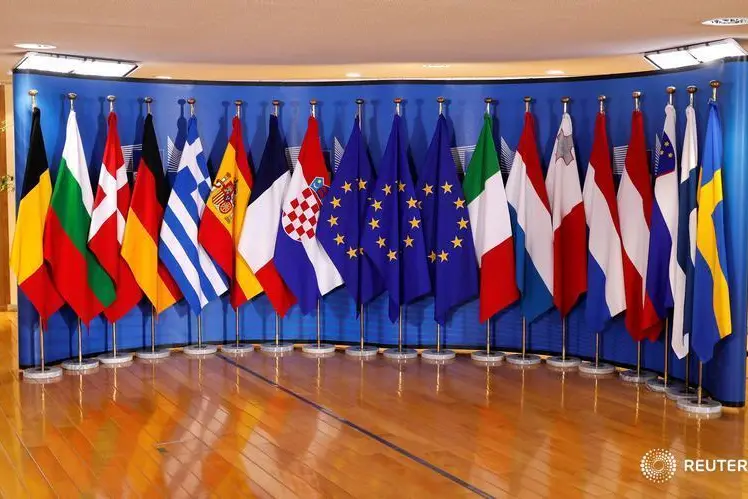PHOTO
The global commentariat has mused and opined on nearly every aspect of the possible implications of the killing of Qassem Soleimani. How will Iran react and when? Will the US take further action? Was President Donald Trump right to make this call and is there some camouflaged, joined-up, well-tested strategy lurking behind this latest move? What will be the impact on Iraq, Iraqis, Syria and Syrians?
Yet one actor barely examined is Europe. How will the European powers react? It says something about where Europe is on the geopolitical ladder in 2020 that this triggers such little interest or comment. Yet is it to the globe’s advantage that Europe is on the periphery?
It is not as if European actors have no interests or even that they are not worried. “World War III” was trending on Twitter in Europe too — a sign of the massive over-dramatization of the events in Iraq, serious as they are. Oil prices went up by $3 a barrel after the strike. Leaders must know by now that 30 percent of the world’s oil tanker traffic passes through the Strait of Hormuz — a shipping lane that Iran can easily block or disrupt. EU states will also be concerned about the impact on the struggle with Daesh, especially if the Iraqi government endorses its Parliament’s demand for foreign forces to leave the country.
The US administration hardly drew breath before making its displeasure with European states public. Secretary of State Mike Pompeo was barely diplomatic when saying: “The Europeans haven’t been as helpful as I wish that they could be. The Brits, the French, the Germans all need to understand that what we did, what the Americans did, saved lives in Europe as well.”
This is not how most European leaders see it. They blame the US for having triggered the crisis in the first place by tearing up the Iran nuclear deal of 2015. Their vain hope that a different US president could relaunch the deal in 2021 has effectively been dashed. The killing of Soleimani is seen broadly as an attack carried out on the whim of a president who tends to act on his gut feelings. Trump reportedly once told his generals: “You don’t need a strategy to kill people.”
Few in the European corridors of power believe the US claim that Soleimani was “actively developing plans to attack US diplomats and service members in Iraq and throughout the region.” They remember 2003 and the misleading US-UK tales of Iraqi weapons of mass destruction and will want to see hard, unimpeachable evidence, especially if the situation deteriorates.
None of this means that European actors are blinkered about Iran’s provocations and destabilizing activities or that Soleimani did not have oceans of blood on his hands. It is not about being on one side or the other. Most states want to be close to the US but find it hard with a president who not does consult, take advice or prepare effectively. They want the reassurance of knowing a cool head is calling the shots.
The primary goal is to seek de-escalation and avoid war at all costs — a position summed up by British Foreign Secretary Dominic Raab, who said: “We have always recognized the aggressive threat posed by the Iranian Quds Force led by Qassem Soleimani. Following his death, we urge all parties to de-escalate. Further conflict is in none of our interests.”
Tellingly, UK Prime Minister Boris Johnson was on holiday in the Caribbean and made no effort to rush back. Staying away meant avoiding the British media, which was desperate for him either to chastise Trump or be seen as his poodle. Johnson cannot afford to alienate the thin-skinned White House occupant while he so badly needs a free trade deal with the US. His first statement on his return on Sunday took the middle ground, not unequivocally backing Trump or criticizing him. This was part of the gradual shaping of the British position, with Raab having told the BBC on Sunday that he understood the American action, though notably he did not use the word “support.”
Britain could be expected to be the most supportive, so one can just imagine how the German political establishment sees this; or President Emmanuel Macron of France, who has worked so diligently to bring Iran and the US to the negotiating table. German Foreign Minister Heiko Maas tweeted bluntly: “The US military operation followed a series of dangerous provocations by Iran. However, this action has not made it easier to reduce tensions. I made this point clearly to Pompeo as well.” Maas wants to engage Iran in direct talks.
The EU’s new foreign policy chief Josep Borrell has invited Iranian Foreign Minister Mohammed Javad Zarif to Brussels for talks. Is this the only European play? How can European powers convince Iran to hold back? Do they have any cards up their sleeve? Many in the Iranian leadership have grown tired of unfulfilled EU promises to find ways around the tough US sanctions regime.
Europe has few options. Close ties with the US mean its approach cannot ignore Washington, but, at the same time, it cannot influence the current president. It can attempt to remain the guarantor for the existing nuclear deal but, in all likelihood, another may need negotiating. The probability is that most states will hunker down, plead for peace and de-escalation, and cross their fingers, knowing that, while observing from the sidelines, they will also be affected by the ramifications of any conflict.
• Chris Doyle is director of the London-based Council for Arab-British Understanding. Twitter: @Doylech
Copyright: Arab News © 2019 All rights reserved. Provided by SyndiGate Media Inc. (Syndigate.info).





















